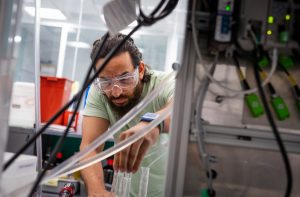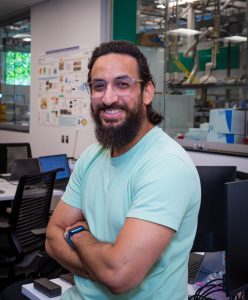Osama Javed Sheikh often says that acquiring knowledge and applying it are two entirely different things, so after spending years learning about the environmental issues facing the world – particularly the wastewater crisis that was devastating his native Pakistan – he earned a bachelor’s and master’s degree in chemical engineering, and then put the knowledge and skills he learned to work.
Now a doctoral student in chemical and biomolecular engineering at the University of Connecticut’s School of Engineering, Sheikh was keenly aware of the current situation in which people were dying from ingesting untreated or inadequately treated wastewater, and from contaminated water dumped into canals, streams and rivers that seeped into aquifers.
Determined to make a difference, he dove into researching wastewater treatment methods and co-founded a company focused on finding and implementing creative, affordable solutions to Pakistan’s wastewater crisis.
His research suggests that nearly 100,000 Pakistanis die each year as a result of direct or indirect contact with wastewater, a number that is probably much higher due to poor health and environmental record-keeping.


Moreover, half of the deaths are children under the age of 5. In Pakistan, more than 95 percent of industrial wastewater is dumped untreated into the environment due to exorbitant costs, corruption, and land requirements. Yet, according to the World Bank, Pakistan spends only $380 million per year to address these challenges, which is about 3.9 percent of the country’s GDP.
By comparison, the United States is expected to spend $106.18 billion on wastewater management in 2022, $113.08 billion in 2023, and $179.2 billion by 2030. The World Bank estimates that the impact of wastewater pollution on Pakistan’s people is at least $16.4 billion per year, measured in economic losses, reflecting the effects of disease and lost land values, tourism, recreation, and investment.


After completing his undergraduate and master’s studies, Sheikh engaged in intensive experimentation and research to develop effective methodologies to meet stringent environmental standards. Working with his brother Muhammad Zaid, an expert in electrical, wireless communications, and coding, and collaborating with the chemical and textile industries, they focused on wastewater treatment. Their efforts were centered on developing pre- and post-treatment systems aimed at zero liquid discharge. Additionally, they were able to revolutionize point-of-use reverse osmosis (RO) systems, significantly extending the lifespan of RO membranes used in water filtration devices that connect to a single fixture to remove contaminants.
After graduating and working in the field for a few years, Sheikh returned to the University of Connecticut, while Zaid remained in Pakistan. Sheikh’s goal, Sheikh explains, was to continue honing the skills and knowledge they needed to take their research to a new level. Sheikh credits his supervisor, Jeffrey McCutcheon, associate professor of chemical and biomolecular engineering at the University of Connecticut, for his support in continuing his research and completing his PhD.
“I re-enrolled at the University of Connecticut to gain advanced technical knowledge that would help me implement a more robust solution in Pakistan,” Sheikh says. “At the same time, we were developing a system to remove the pigments and proteins, and applied for a prestigious grant to support that research along with the system we had already developed.”
Every Drop is Precious
In 2018, before returning to the University of Connecticut, Sheikh and his brother co-founded SE DROP (Save Every Drop). Sheikh had been working as a field engineer for a multinational company, but wanted to focus his full time on research and product development. As a result of their research, they created a process called Molecular Distortion Technology (MDT), which revolutionizes the way wastewater is treated by using electricity to break down pollutants at a molecular level. Sheikh describes the system, which is currently patent pending, as compact, portable, economical, and easy to install and operate.
Once installed, their systems run for 3-5 years without major maintenance and with minimal energy consumption. Their technology requires little training to use and is tailored for Pakistan’s textile industry, which uses millions of gallons of water every day.
“MDT is more than just a technological advancement; it seamlessly integrates into existing infrastructure, providing a practical solution that directly addresses wastewater issues and reduces dependency on freshwater sources,” Sheikh said. “The system not only conserves water, but also reuses it for multiple uses, fostering a more sustainable ecosystem.”
To put this in perspective, Sheikh says that more than 200 litres of water is consumed to make one kilogram of fabric, which is typically wasted. This wastewater contains up to 20,000 chemicals and is discharged into the environment untreated. As a result, 20 percent of freshwater pollution comes from processing and dyeing textiles, according to a World Bank study and other organizations.
In addition to water pollution, the textile industry is the second largest emitter of greenhouse gases in the world after the oil industry. Total greenhouse gas emissions from textile production amount to 1.2 billion tons per year, accounting for 10% of global carbon emissions. Moreover, the consumption of fossil fuel-based electricity, the main energy source in the clothing production process, significantly exacerbates greenhouse gas emissions.
Together, Sheikh and his brother implemented Pakistan’s first grey water recycling system in Islamabad, saving 36,000 gallons of water every month. Additionally, they developed an innovative storm water drainage recycling system that garnered international attention. According to Sheikh, their innovation journey has included participation in Dubai GITEX 2020, Turkey’s TRT World Forum, Singapore’s Young Founders Programme, and winning Pakistan’s National Startup Competition in 2022, where they were recognised by Pakistan’s President Arif Alvi.


Moving to larger solutions, education and collaboration
Their efforts have led to another important milestone – winning a $505,000 grant from the UK Foreign, Commonwealth and Development Office (FCDO) in 2023. This is in partnership with Dr. Wakil Shehzad of Northumbria University in the UK, and has been designated to strengthen their capacity to pursue sustainable water solutions.
According to Sheikh, the grant will be used to foster collaboration with like-minded organizations and experts with the goal of sharing knowledge and driving positive change in Pakistan. It will also focus on education and raising awareness about the importance of sustainable textile practices. This is especially important, Sheikh said, explaining that developing and implementing the science is often easier than getting people to understand its value and buy in. Cultivating an open attitude to innovation and navigating culture, costs and politics is extremely complex and challenging, especially in Pakistan, he added.
“We want to play a key role in reducing Pakistan’s environmental footprint and help drive positive change,” Sheikh said. “We believe that creating a circular economy in the fashion industry requires the power of collaboration and innovation. This grant will help us advance our mission to transform wastewater into a valuable resource and promote eco-friendly practices in Pakistan and ultimately other countries facing similar water-related and environmental challenges.”

